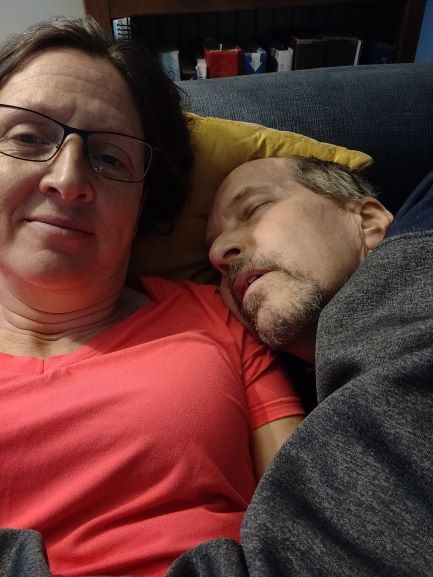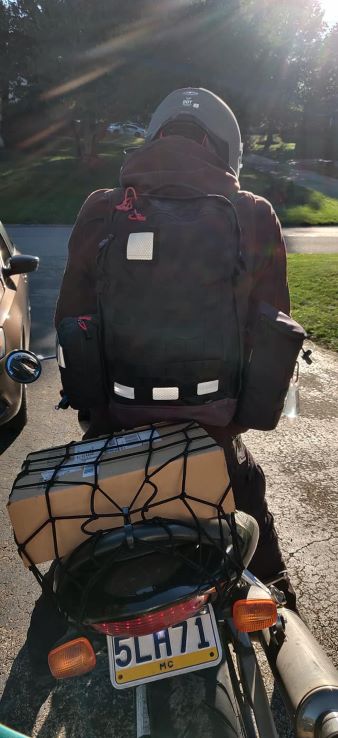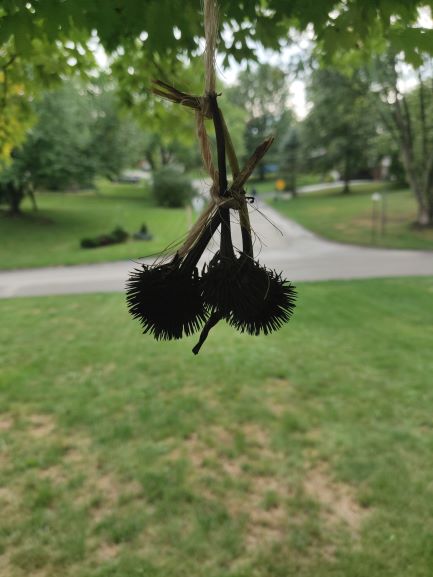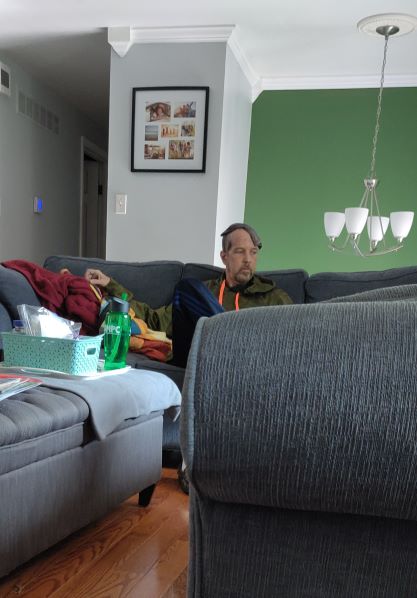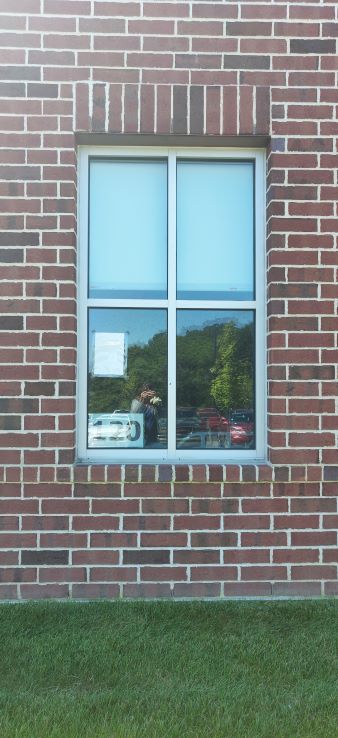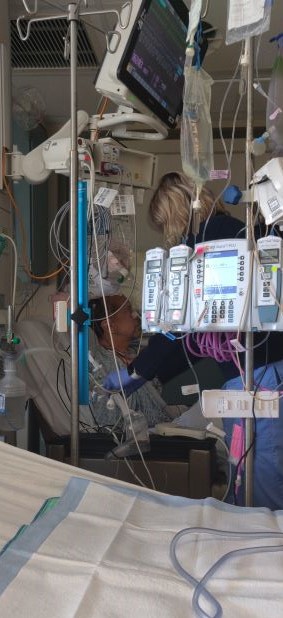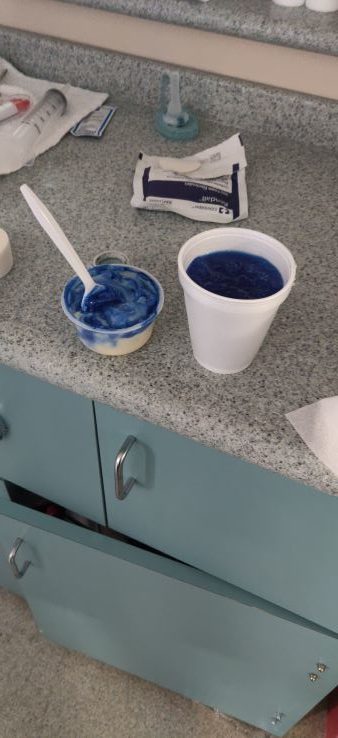4:00am: I wake up as Mark sits up in bed. He finds his shoes and slowly walks to the bedroom door. Is he finished sleeping? Is he relocating to the couch? I roll over and go back to sleep.
6:15am: I give up on sleep and go into the living room. Mark’s asleep on the couch. He wakes up, sits up, says good morning. I let out the dogs and then walk over and pour us each a cup of coffee. I hear Mark say to Robert, “Go let Diane in.” I come out of the kitchen. What did you just say to the dog? “I thought you were locked outside, so I was telling Robert to let you in.” Okay. I check the table and silently register that he has not taken his morning medications. I grab my coffee and book, and I sit down next to him. The puppy jumps onto my lap and curls up. This is one of my favorite times of day.
7:04am: Matthew goes out to catch the schoolbus. On Mondays and Tuesdays, he goes to school in person.
7:05am: Matthew returns, having forgotten his mask. He will do this again tomorrow. And next week.
7:15am: Mark’s vomiting in the kitchen sink. This is my second least favorite place for him to vomit, especially since I didn’t do the dishes last night. My least favorite place for him to vomit was discovered yesterday. After eating lasagne for lunch, he went into the bedroom, opened his sock drawer, and promptly vomited. Half on the carpet, half in the sock drawer. Lasagne. My favorite place for him to vomit would be the toilet. That appears to be his least favorite. I cleaned it up.
7:25am: Mark is back on the couch. He asks me what time Michael is coming home tomorrow. I sit down next to him again, picking my words carefully. “Michael is not coming home tomorrow,” I say gently. “Why do you think he’s coming home?” He looked confused. “I don’t know,” he said, “I just did.” This weekend, he recalled the Ben had thrown javelin in high school when he was on the track team. This did not actually happen. Not the track team, not the javelin. It’s very hard to know what to make of these lapses in memory and cognition. When to let it go and when to say something corrective. When to worry. When to call the doctor. I let this one go.
7:30am: Mark is back asleep on the couch.
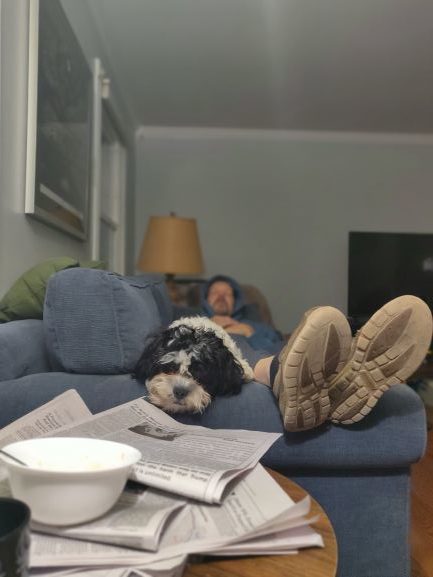
7:45am: Bobby arrives. We talk about the most recent person he knows who overdosed. This was a friend of his who has struggled for years with addiction, cycling through prison, rehab, and the final place Bobby sees a lot of addicts go, in the ground. “It’s like when you turn a cucumber into a pickle. You can’t turn it back into a cucumber ever again.” He shakes his head. I shake mine.
8:00am: I go back into the bedroom and log onto Zoom for my first class. Seventh grade. One kid who has a cold is on Zoom rather than in school. Another kid is on Zoom because the family had a Covid exposure and is waiting to get negative tests. The rest of the class is in-person, and joins me by Zoom too. They have a quiz on mitosis, and a lab to extract DNA from strawberries. My classroom co-teacher and I figure out how to give the quiz to the kids who are remote, how to get them involved in the lab that they aren’t there to do. The kids are not happy about the quiz, and they are thrilled by the lab. The seemingly magical ability to pull something from the microscopic universe into the visible. The ability to do anything can feel like a miracle right now.
9:30am: While I have Bobby to watch Mark, I decide to use my break between classes to get in a walk. I tell Mark and Bobby that I’m going to the bike trail. I drive the five minutes to the trailhead, put on my Spotify playlist, sing aloud on the empty trail. I watch the trees go by, working to hone my tree identification skills. I watch for birds. I spot nests that have been hidden behind the screen of green during the warm months. I stand at a river crossing and watch the bird action in an old sycamore tree. Beneath it, I find one of my holy grails: juncos. An early sign of winter. I love watching for early signs of the next season. Plants tell you where you are in time. Birds can tell you where you are going. If only life were that easy.

11:00am: Mark is asleep on the couch when I get back home. He wakes up when he hears me. I go into the kitchen to heat up plates of lasagne, one for me and one for Bobby. I overhear Mark tell Bobby he can’t workout because we are going somewhere. I go over and sit next to Mark. Where do you think we are going? He looks at me and says nothing. I ask again. And again. Finally I decide to make sure he’s oriented. What day is it? Friday, he says. Hmm. I ask the month, the year, who’s going to win the election next week? “Trump,” he says. At least he understood the question and named a candidate. Since we did early voting two weeks ago, he’s asked me a few times who won. Bobby and I yuck it up a bit about the election, already knowing we are on opposite sides.
11:10am: I am back on Zoom, teaching.
12:00pm: Time for Bobby to leave. I relocate from the bedroom to the living room to continue teaching by Zoom while keeping an eye on Mark. He watches me teach. I watch him watch me.
12:15pm: Bobby calls me to debrief about how Mark seemed. We both thought he seems more confused today. Bobby said Mark didn’t know where I was after I left for my walk. It’s not enough to escalate it to a concern about something acute happening, we decided. Just a watch and wait. Bobby’s going to try playing some poker as well as exercise with Mark when he comes back on Wednesday, to give Mark’s brain and body both workouts.
12:30pm: My class ends. I sit next to Mark, and I try to as casually as possible ask him what he remembers has happened so far today. He’s quiet. Nothing. He finally says he doesn’t remember anything. I give him a kiss, and he goes back to sleep. It’s maybe his fourth nap of the day. Why is he so tired? We did take a walk at the mall yesterday, and he was able to do the full lap upstairs and downstairs. Still, this seems excessive.
1:00pm: I have a Zoom meeting. Mark is still asleep. I decide to leave Mark alone in the living room.
2:00pm: I come out to find that Mark is still sleeping. I wake him up and ask him if he’s had lunch. Yes, he says. What did you have? “Lasagne,” he says. I check the kitchen. No new dirty dishes. I leave it be.
2:35pm: Matthew is home from school. Mark and I are on the couch. Matthew maintains eye contact only with me as I ask him about his day. When did that start? I wonder. He tells me about his mythology test, about how far his balsam wood flyer went in engineering class. I checked his learning management platform online, and ask about a couple missed assignments while praising him for his good grades. Mark listens quietly, not asking any questions. I’m not sure if he can hear Matthew well enough. Matthew grabs the leash to take Duppy for a walk.
2:45pm: Mark is back asleep. I think about dinner. It will take me an hour and a half to make. I should have dinner ready by 6:00pm so that I have time to clean up and shower before our nightly schedule of news, Jeopardy and Wheel of Fortune starts. If I do an hour more of school work, I can fit in a nap before dinner. I get going, keeping my eye on Mark, the clock, work, Matthew, and our life.
7:00pm: Dinner is finished. The dishes are done, the trash is taken out, I am in my beloved Laura Ingalls Wilder flannel nightie. We are watching Jeopardy. A Biden commercial comes on. Obama is the narrator, giving a beautifully composed speech over the images of Biden. “I miss having a president who was a good speaker,” I say. “He’s still president,” Mark says. I pause, looking respectfully for the logic. Coming up short. “Who is still president?” I say. “Obama,” Mark says.
8:00pm: We say goodnight to Matthew. Retire, as the old folks say, for the night. We lay down in bed. I realize I don’t have any water to take a nighttime medication of my own. Mark hands me his water bottle. “We’re a team,” he says. Yes, yes we are. I ask Mark if he’s done his sinus rinse. He says yes, he did it this morning. I check. There’s almost, if not completely, the same amount in the bottle as yesterday. “Well I didn’t use it all,” he says. “You’re supposed to,” I said. My mind flashes to last week, watching the ENT surgeon scope him yet again. Watching Mark flinch and cringe as they clean his sinuses, the light from the scope glowing under the skin between his eyes. “It’s a waste,” he said. Of what? I ask. It’s water and saline. It’s pennies. It’s nothing. The use of logic fails. He doesn’t understand. I kiss him goodnight. “Goodnight, baby,” he says and, starting my second favorite part of the day, wraps his right hand around my arm and falls asleep.
